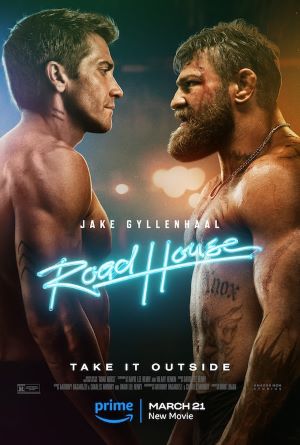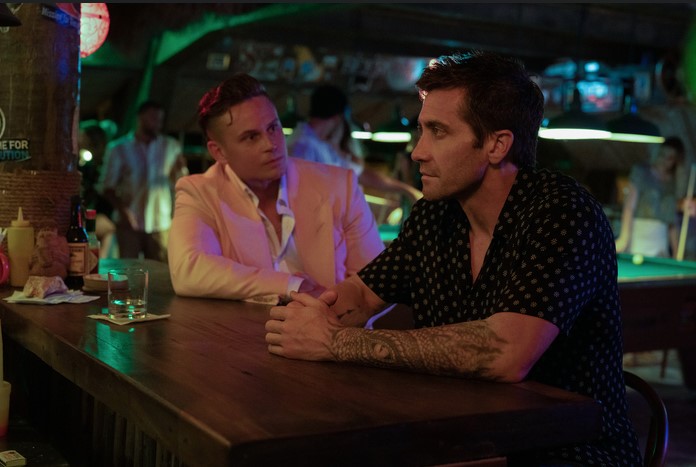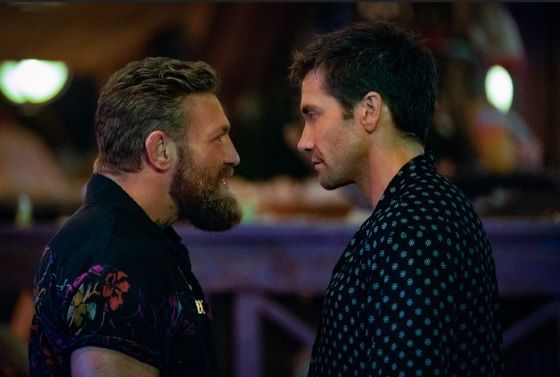

[Rating: Minor Rock Fist Down]
Streaming on Amazon Prime March 21.
“Will you shut that shit off! I can’t listen to that crap, it’s got no heart.” -Brad Wesley (Ben Gazzara), Road House (1989)
Man, oh man…what would Brad Wesley have thought of this, then? An ugly, joyless, uninspired, lazy legacy rehash, this new Road House is little better than the direct-to-video sequels that coasted on the hard-fought legacy of the original. Aware of the genre and tone it should occupy, but with no idea (interest?) how to exploit it or position its characters for success in that arena, the movie is a let-down from the first punch to the last.
Dalton (Jake Gyllenhaal) is fighting unlicensed bare-knuckle warehouse bouts when bar owner Frankie (Jessica Williams) happens upon him. Frankie is looking for a tough bad ass to drive out the disruptive element terrorizing her establishment in the Florida Keys, and although he’s initially resistant, Dalton eventually agrees to her terms. A former UFC fighter, Dalton has no real qualifications for the position except that he knows how to scrap, something he does at the eponymous “Road House” only after trouble is well underway and property damage has exceeded any reasonable investment calculation.
Along the way, Dalton runs afoul of the local sheriff (Joaquim de Almeida), a nearby crime lord, Ben Brandt (Billy Magnussen), and Ben’s hired tough guy, Knox (Conor McGregor). Dalton also makes friends with ER doctor, Ellie (Daniela Melchior), a local bookstore owner, Stephen (Kevin Carroll), and Stephen’s plucky daughter, Charlotte (Hannah Love Lanier). None of these people exist as actual characters, though: just as props to get Dalton and the movie through its required narrative paces. Indeed, the worst among them in this regard is Charlotte, whose sole purpose in the picture seems to be to remind the audience of the film’s genre roots, like when she comments on Dalton’s arrival to town, “That kinda sounds like the plot to a western. Like, local townsfolk send for a hero to help clean up the rowdy saloon.”
The script does some handwaving about Dalton’s troubled past, but it is just window dressing to get from one sequence to the next. Nothing in Road House matters from scene to scene, and while ideas are presented, they seem to disappear just as fast (almost as if this script was copy-and-pasted together from a dozen different drafts over a handful of years).

Dalton clocks a knife under a guy’s shirt 35 minutes in, but doesn’t avoid the one carried by the dude who stabs him in the first few minutes: meh, who cares? Jessica pays Dalton to clean up the bar, yet every fight that happens is allowed to spiral into a full-blown royal rumble before the bouncer takes any action: yeah, why not? Post Malone appears in the opening sequence as a famous fighter, and is even mentioned again later only to never reappear: pssh, what’s it matter, at least he’s on the soundtrack, right?
None of this might have mattered much if Gyllenhaal did something … anything for this performance (besides what appears to be a startling amount of HGH). In the original, the cocky and self-assured Patrick Swayze gave his “be nice” speech to introduce the audience to his Zen-like approach to the hyper-aggressive clientele of the Double Deuce. In this remake, Dalton is fighting some vaguely defined internal battle against his baser nature, giving his whole nice guy schtick a flat Xanax-inspired flavor that never pays any dividends.
The movie does show Dalton working out and doing yoga on a boat, which admittedly goes part of the way towards explaining why he’s a goddamned Julienne Salad in this thing. Seriously, shredded doesn’t begin to describe it, and if this movie all took place in the half day before his UFC weigh-in when he was 3-days dehydrated to make weight, it might have actually made sense or added something to the story (but this isn’t that kind of movie).

For his part, McGregor is … interesting. Which is not to say that he is bad, per se, but more like a coked-up alien inhabiting a human body for the first time without an instruction manual. Like Gyllenhaal, he only has one speed in Road House, but unlike his counterpart it is full-throttle instead of clutch-stuck neutral. This is entertaining enough for the two action scenes in which he appears, and both he and Gyllenhaal move like real fighters, but the choreography, blocking, and camera work take the edge off anything they do.
It’s just not good. A few side bits do work, like Knox’s habit of never parking a car, or any of the moments where reluctant henchman Moe (Arturo Castro) makes an appearance, but everything that made the original a good time is absent, here. The 1989 version leaned into its genre roots by taking western tropes and wrapping them up in 1980s action exploitation clichés while this one seems actively afraid of just such an embrace. Director Doug Liman and the movie have an R rating to play with to explore this habitat, yet there’s a desperate shortage of sex, drugs, and gratuitous violence, here.
Where’s the fun? Where’s the swagger, the sidekicks, and the “heart” Brad Wesley spoke about it in the original? From the looks of things, the resources required for these assets all ended up in Gyllenhaal’s abs budget.





Comments on this entry are closed.